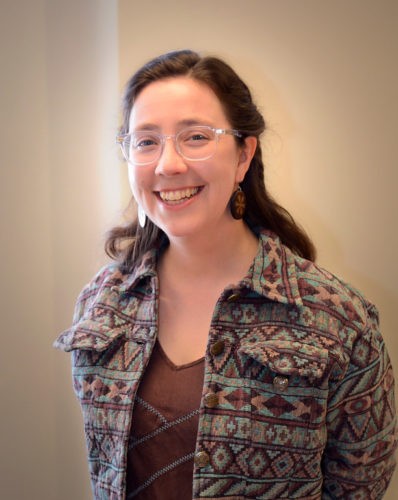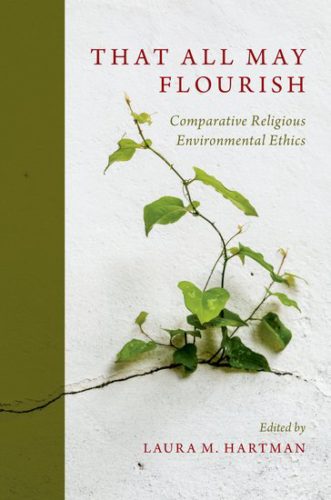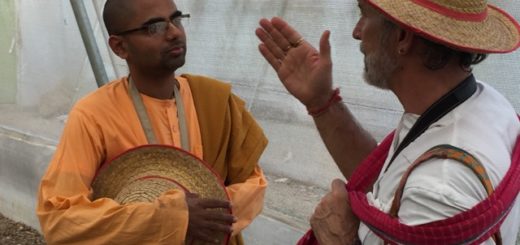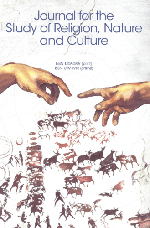Interview with Laura Hartman – That All May Flourish

Author and ISSRNC Member Laura Hartman
The ISSRNC recently caught up with Laura M. Hartman to discuss her new edited book, That All May Flourish: Comparative Religious Environmental Ethics (Oxford 2018), which includes contributions from several members of the ISSRNC. Hartman teaches environmental studies at Roanoke College. She has also taught at Augustana College and the University of Wisconsin Oshkosh. In addition to being the editor this new work, Hartman also is the author of The Christian Consumer: Living Faithfully in a Fragile World (Oxford, 2011).
ISSRNC:
Congratulations on the publication of your new book! What are the most important points that you hope readers will take away from this work?
Laura:
Environmental problems cannot be solved with only one way of thinking, so multiple perspectives and productive dialogue are key. Similarly, bridging religious differences happens slowly in the abstract, but all religions value (for example) clean water: environmental issues bring common ground to interfaith dialogue. The intersection of comparative or dialogical religious ethics with environmental ethics is an incredibly fertile area, in which far too little work has been done. Traditionally, comparative religious ethics requires that one be an expert in more than one religion. I hope that this book shows that scholars of good will, absent such multiple expertise, may still find fruitful dialogue and generative insight when they can listen to each other and work together.
ISSRNC:
What sparked the idea for this project?
Laura:
That All May Flourish arose out of a need. I suffer from inadequate training in religions other than Christianity. As a graduate student, I reasoned that Christianity was the religion of powerful elites in this country, so if I am to “make a difference for the environment,” I had better learn to “speak Christian.” I don’t regret the choice to dive deeply into Christianity but I do regret my shallow knowledge about other religious and spiritual traditions.
So this book outsources the expertise: this intrepid group of scholars wrote chapters using a variety of religious traditions, in response to a prompt about flourishing and environmental ethics. The prompt grew out of my unrest after writing The Christian Consumer. I never answered the deepest question that consumption raises: how can we live and flourish, knowing our flourishing, like it or not, involves devouring others? Mutual flourishing between humans and non-human nature sounds great, but is it even possible? Don’t we live by nature’s destruction? Luckily for me, these scholars brought the full force of their insight and knowledge from the world’s religious traditions to bear on these questions, to fascinating results.
ISSRNC:
One of the distinguishing features of your book is the dialogue chapters where authors put their work into conversation with each other. Tell us more about these dialogues, and what insights were gained from including them.

Laura:
I paired the authors, sometimes in truly mismatched pairs, and convinced them to engage in dialogue (usually via Skype). I have always been interested in interfaith dialogue and in its more intellectual cousins such as Scriptural Reasoning (of the type engaged in by Peter Ochs at my alma mater, the University of Virginia). Thankfully, the authors were willing to give it a try, and they produced the dialogue chapters that punctuate the structure of the book. I think the dialogues add a lot, in insights and in leavening the tone of the volume. I also think they present a tremendous opportunity for teachers; as I write in the conclusion, students could imagine different pairings and discuss what might happen in those dialogues.
ISSRNC:
What advice can you offer other ISSRNC members who are thinking about becoming editors of a book?
Laura:
I had been warned that editing books is hard: corralling the people was just as difficult as I expected. I actually lost three contributors, all scholars of color. One died; the other two were overwhelmed by other commitments and had to bow out. It is a sad truth that we do not have enough scholars of color in this field, and those who do exist are overcommitted as a result. On the bright side, the book contains a large number of female contributors, and we have multiple religions represented, including less populous traditions such as neo-paganism and indigenous groups.
ISSRNC:
Now that you have finished That All May Flourish, what’s next on the horizon for you?
Laura:
I have long pondered the intersection of transportation and ethics. In the USA and some other countries, too many of us are automobile-bound: we have no choice but to drive. But cars, of course, pollute more than most other modes of transport and also exclude or constrain mobility for children, elderly, disabled, and other populations who cannot operate a vehicle. There is an ethical problem here, constrained by vast and complex social, cultural, and political systems that are notoriously slow to change. I hope that bringing tools of religious ethics to bear on this topic will help move our culture towards more sustainable transportation.
More information about That All May Flourish can be found online at Oxford University Press.












